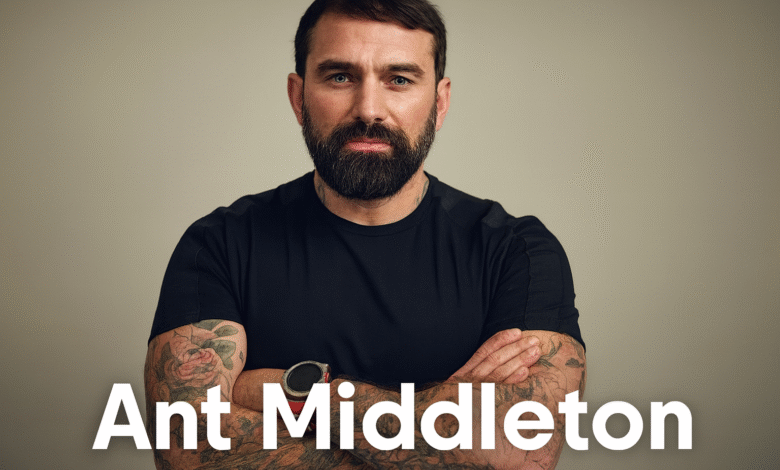Ant Middleton: Triumphs and Trials of a Fearless British TV Personality
From Special Forces glory to public controversies – the extraordinary journey of a man who refuses to quit

Introduction
Ant Middleton is one of the most recognisable names in modern British television, celebrated for his unflinching resilience, military expertise, and ability to inspire audiences worldwide. Known for pushing himself and others beyond perceived limits, he has transitioned from an elite soldier to a global media figure. Yet, his path has also been marked by controversies and personal challenges that have shaped his public image.
As a British TV personality, Middleton’s career encompasses high-adrenaline adventures, bestselling books, and high-profile speaking tours. His life story combines moments of great triumph with hard-learned lessons, offering an authentic portrayal of determination, adaptability, and the realities of living in the public eye.
Quick Bio
| Full Name | Anthony Middleton |
|---|---|
| Date of Birth | 22 September 1980 |
| Age (2025) | 44 Years |
| Birthplace | Portsmouth, Hampshire, England |
| Nationality | British |
| Profession | Former Special Forces Operator, British TV Personality, Author, Speaker |
| Spouse | Emilie Middleton |
| Children | Five |
| Net Worth | Approx. £4 million |
| Primary Income Sources | Television, Books, Speaking Engagements, Tours, Brand Collaborations |
Early Life and Background
Ant Middleton was born in Portsmouth, Hampshire, and spent part of his childhood in France following the loss of his father. This early relocation instilled a sense of adaptability and self-reliance, traits that would later define his professional and personal life. His formative years were shaped by a desire for challenge, which ultimately led him to the armed forces at the age of 17.
From an early age, Middleton demonstrated a natural drive for leadership and physical endurance. Growing up between two cultures helped him develop a broader perspective, while also reinforcing a strong sense of discipline and independence.
Military Beginnings and Career Development
Middleton began his military journey in the British Army, joining the 9 Parachute Squadron Royal Engineers. He quickly established himself as a dedicated soldier, serving in operational deployments to Northern Ireland and Macedonia. These early assignments honed his tactical skills and mental toughness.
In 2005, he joined the Royal Marines and successfully completed the gruelling Commando Course, earning the King’s Badge for outstanding performance. His time with 40 Commando included deployment to Afghanistan, where he gained valuable frontline experience in complex combat environments.
Special Forces Experience and Elite Service
After excelling in the Royal Marines, Middleton earned a place in the Special Boat Service (SBS), one of the UK’s most elite military units. Over four years, he operated as a point man, sniper, and primary fires operator, serving on critical missions in Afghanistan and other locations.
This period solidified his reputation for precision, courage, and unwavering commitment. The lessons learned in the SBS – about leadership, decision-making under pressure, and teamwork – would become central themes in his later television and writing career.
Transition to Television and Public Recognition
Middleton’s media breakthrough came as the Chief Instructor on Channel 4’s SAS: Who Dares Wins. His authoritative yet motivational style resonated with viewers, propelling him into the spotlight as a respected British TV personality.
Beyond SAS: Who Dares Wins, he hosted other adventure and survival shows such as Mutiny, Escape, Extreme Everest, and the Australian version of SAS: Who Dares Wins. These roles showcased his ability to adapt his Special Forces expertise for television, inspiring audiences to embrace resilience and self-belief.
Authorship and Motivational Work
Middleton is also a bestselling author, known for titles like First Man In, The Fear Bubble, and Zero Negativity. His books blend personal experiences with actionable strategies for overcoming adversity and achieving goals.
His motivational speaking tours, such as “Mind Over Muscle” and “The Trilogy Tour,” have drawn large audiences, demonstrating his appeal beyond television. These events allow him to connect directly with the public, sharing insights from both his military and media careers.
Business Ventures and Income Sources
In addition to television and publishing, Middleton has built a brand around mental and physical resilience. His revenue streams include speaking engagements, merchandise, brand partnerships, and international media appearances.
He has managed business ventures under his company, earning substantial income from both UK and overseas projects. These diverse pursuits have contributed to his multi-million-pound net worth, though his career has not been without financial challenges.
Challenges, Controversies, and Setbacks
Middleton’s journey has also been marked by setbacks, including legal issues and public disagreements. At times, his outspoken views have sparked media debates, while financial disputes have resulted in business restrictions.
However, his willingness to confront difficulties head-on and remain active in his professional life reflects his enduring resilience. Even during challenging periods, Middleton has maintained his relevance and continued to expand his international presence.
Latest Developments and Current Work
In recent years, Middleton has been active in global television projects, public speaking, and personal adventures. He has expanded his profile in Australia and the Middle East, continuing to position himself as a global figure in motivational media.
Currently residing in Dubai, he remains committed to delivering high-energy, inspirational content. His future plans include further television projects, book releases, and potential political engagement in the UK.
Legacy and Impact
Ant Middleton’s legacy lies in his ability to translate the high-stakes lessons of elite military service into accessible life guidance. Through television, books, and live events, he has inspired countless individuals to embrace discipline, courage, and self-improvement.
While his story includes moments of controversy, it also reflects the reality that resilience often emerges from adversity. Middleton’s unique combination of military credibility, media charisma, and motivational insight ensures his influence will endure for years to come.
Conclusion
Ant Middleton’s life is a testament to the power of adaptability, discipline, and perseverance. From the battlefields as a Special Forces operator to the television stage as a British TV personality, he has faced both acclaim and criticism. His journey offers lessons on overcoming obstacles, seizing opportunities, and maintaining personal integrity in the face of public scrutiny.
Despite challenges, Middleton continues to inspire audiences around the world with his message of resilience, making his story not just one of survival, but of constant reinvention.
Frequently Asked Questions
Q1: Who is Ant Middleton?
Ant Middleton is a former Special Forces operator, bestselling author, motivational speaker, and British TV personality known for hosting SAS: Who Dares Wins.
Q2: How many children does Ant Middleton have?
He has five children, including one from a previous relationship and four with his wife, Emilie.
Q3: What is Ant Middleton’s net worth?
As of 2025, his net worth is estimated to be around £4 million, earned through TV, books, tours, and brand collaborations.
Q4: What are his most famous books?
His notable works include First Man In, The Fear Bubble, and Zero Negativity, all of which have been bestsellers.
Q5: Where is Ant Middleton now?
He is currently based in Dubai, continuing his work in television, public speaking, and writing while expanding his international media profile.



